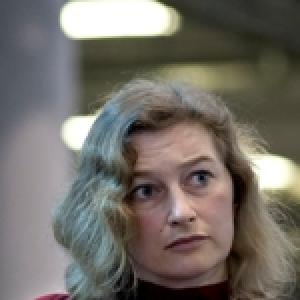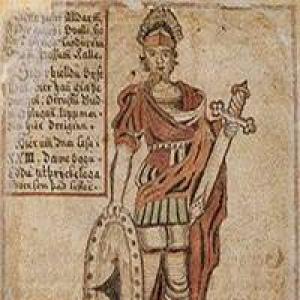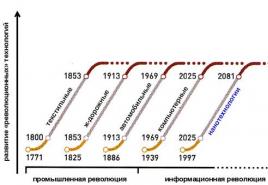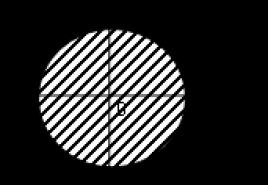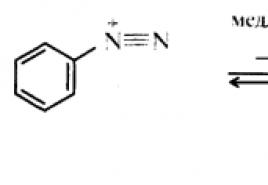What is said in the poem The Bronze Horseman. Pushkin “The Bronze Horseman” - analysis
Poem "The Bronze Horseman". Conflict between authorities and people.
The poem "The Bronze Horseman" was written by Pushkin in 1833. In it, Pn, for the first time in Russian literature, contrasted the state, personified in the person of Peter I, and a person with his personal and private interests and experiences. The reforms of Peter I in Russian history were a deep and comprehensive revolution that could not be accomplished easily and painlessly. Peter I demanded every effort from the people to achieve the goals he had set out, and this caused grumbling and discontent. The same ambiguous attitude was towards Peter’s favorite brainchild - St. Petersburg. He personified both the greatness of Russia and the slavery of its people. On the one hand, it was a beautiful city with its palaces, monuments and golden domes, but at the same time, St. Petersburg shocked with its poverty of life, misery and the highest mortality rate in Russia. Another misfortune of St. Petersburg was the terrible floods that destroyed houses and claimed human lives. While building St. Petersburg on the shores of the Gulf of Finland, in a swamp, Peter did not care at all about the future residents of his capital. In addition, it was built “to spite the arrogant neighbor” and nature. And the elements seemed to take revenge on people for their deeds. In "The Bronze Horseman" Pn describes one of the most terrible floods that occurred in 1824 and brought terrible destruction to the city: Siege! attack! evil waves, like thieves, climb into the windows. The canoes are hitting the windows with their sterns as they run. Trays under a wet veil, Wrecks of huts, logs, roofs, Goods of thrifty trade, Belongings of pale poverty, Bridges demolished by a thunderstorm, Coffins from a washed-out cemetery Floating through the streets! The poem has two main characters: Peter I, who personifies the state, and the poor official Eugene. He is a descendant of a noble but impoverished family. This is a hardworking young man who wants to create his own happiness with his own hands. He has a bride whom he loves and whom, having received a good place, he wants to marry: Perhaps a year or two will pass - I’ll get a place, I’ll entrust to Parasha our family And the upbringing of the children... And we will live, and so on until the grave Hand in hand we will both get there, And our grandchildren will bury us... But his dreams were in vain, since Parasha and her mother died during the flood. Evgeny himself goes crazy, unable to bear the emotional turmoil. Mad, he wanders around the city and one day finds himself near the monument to Peter I. This is the Bronze Horseman. And it becomes clear to Eugene who was responsible for the death of his bride, his broken life and happiness. He challenges: “Welcome, miraculous builder!” He whispered, trembling angrily, “Too bad for you!” .." And suddenly it seems to the madman that the formidable king leaves the rock and gallops after him to punish him for his insolence: And all night long the poor madman, Wherever his feet turned, The Bronze Horseman galloped after him everywhere with a heavy stomp. After this terrible night, Eugene he tried to avoid this place, and if he passed by, then “he took off his worn cap and did not raise his embarrassed eyes.” Thus, he was completely destroyed and crushed by the state, the personification of which was Peter I. The poem ends with the death of Eugene: he was found dead. near the collapsed house of Parasha, Eugene is one of the unwitting victims of Peter’s case, and Peter is the indirect culprit of his death, he sympathizes with his hero, he calls him unfortunate, poor, but the end of the poem is a hymn to statehood, a hymn to Peter I - the most powerful of the Russians. autocrats, founder new capital, bringing Russia closer to the West. P-n was always attracted by the figure of Peter I, he dedicated many of his works to him, so the opinion of critics about whose side P-n, separated. Some believed that the poet substantiated the right of the state to dispose of a person’s life, and took the side of Peter, because he understood the necessity and benefit of his reforms. Others consider Evgeniy's sacrifice unjustified. It seems to me that Pn, for the first time in Russian literature, showed all the tragedy and intractability of the conflict between the state and the private individual.
In 1833, Alexander Sergeevich Pushkin had already gotten rid of hopes for the enlightened reign of Nicholas I, when he presented his thoughts about the fate of the people and the Pugachev rebellion in his novel The Captain's Daughter, when he traveled across all of Russia to Orenburg. As a result, he retires to the estate of his wife Boldine to collect his thoughts, where he creates a poem "The Bronze Horseman", which is dedicated to the reformer Peter the Great. Pushkin calls his work a “St. Petersburg story” (in the drafts - a “sorrowful story” and “sad legend”) and insists that “the incident described in this story is based on the truth.”
In The Bronze Horseman, Pushkin poses two of the most pressing questions for his time: about social contradictions and about the future of the country. To do this, he shows the past, present and future of Russia as an inextricable whole. The impetus for the creation of the poem can be considered Pushkin’s acquaintance with the third part of the poem “Dziady” by the Polish poet Adam Mickiewicz, in the appendix of which there was a poetic cycle “Petersburg”.
It included the poem “Monument to Peter the Great” and several other poems containing severe criticism of Nicholas Russia. Mitskevich hated autocracy and had a sharply negative attitude towards Peter I, whom he considered the founder of modern Russian statehood, and calls the monument to him “a block of tyranny.”
The Russian poet contrasted his philosophy of history with the views of the Polish poet in The Bronze Horseman. Pushkin had a very great interest in the era of Peter the Great. He appreciated the progressive activities of Peter, but the appearance of the tsar emerges on two levels: on the one hand, he is a reformer, on the other, an autocratic tsar, forcing people to obey him with a whip and stick.
The poem “The Bronze Horseman”, profound in content, was created in the shortest possible time - from October 6 to October 31, 1833. The plot revolves around Eugene, a poor official who challenges the statue of the emperor - the founder of St. Petersburg. This insolence " little man"is explained by the shock that the hero experienced when, after a flood in St. Petersburg, he lost his bride Parasha, who found herself in the flood zone.
All the events described in the poem unfold around the main characters: there are two of them - the petty official Eugene and Tsar Peter I. The introduction to the poem is a detailed exposition to the image of Peter: this is both an elucidation of the historical role of the sovereign and a description of his activities. The theme of the glorification of Peter in the introduction is imbued with faith in the future of Russia; it sounds pathetic. The beginning of the first part, where the poet glorifies the young “city of Petrov,” sounds just as solemn.
But next to the sovereign finds himself a poor official, dreaming of the ordinary - of family and modest income. Unlike other “little” people (Vyrina from or Bashmachkina from “The Overcoat”), Evgeny’s drama in “The Bronze Horseman” lies in the fact that his personal fate is drawn into the cycle of history and is connected with the entire course of the historical process in Russia. As a result, Eugene confronts Tsar Peter.
The flood is the central episode of the work. The meaning of the flood is the rebellion of nature against the creation of Peter. The furious anger of the rebellious elements is powerless to destroy the city of Peter, but this becomes a disaster for the social lower classes of St. Petersburg. Therefore, rebellious feelings awaken in Eugene, and he reproaches heaven, which has created man too powerless. Later, having lost his beloved, Evgeniy goes crazy.
A year later, during the same stormy time as before the flood of 1824, Eugene remembers everything he experienced and sees on “Petrova Square” the culprit of all his misfortunes - Peter. Saving Russia, Peter raised her on her hind legs over the abyss and with his will founded a city above the sea, and this brings death to the life of Eugene, who was dragging out his miserable life. And the proud idol still stands on an unshakable peak, not considering it necessary to even look towards insignificant people.
Then a protest is born in Evgeny’s soul: he falls to the bars and angrily whispers his threats. The silent idol turns into a formidable king, pursuing Eugene with his “heavy, sonorous galloping,” eventually forcing him to humble himself. The rebellion of the “little man” against Peter was defeated, and Eugene’s corpse was buried on a deserted island.
The poem reveals to the reader the attitude of the humanist poet, who recognizes everyone’s right to be happy, to the brutal suppression of the rebellion. The author deliberately evokes sympathy for the fate of “poor Eugene”, crushed by historical circumstances, and the ending sounds like a mournful requiem, like a bitter echo of a pathetic prologue.
- “The Bronze Horseman”, a summary of the parts of Pushkin’s poem
- “The Captain’s Daughter”, a summary of the chapters of Pushkin’s story
Illustration by A. N. Benois
“On the shore of the desert waves” of the Neva Peter stands and thinks about the city that will be built here and which will become Russia’s window to Europe. A hundred years passed, and the city “from the darkness of the forests, from the swamps of blat / Ascended magnificently, proudly.” Peter's creation is beautiful, it is a triumph of harmony and light, replacing chaos and darkness.
November in St. Petersburg breathed cold, the Neva splashed and made noise. Late evening A petty official named Evgeniy returns home to his closet in a poor area of St. Petersburg called Kolomna. Once upon a time his family was noble, but now even the memory of this has been erased, and Eugene himself shuns noble people. He lies down, but cannot fall asleep, distracted by thoughts about his situation, that the bridges have been removed from the rising river and that this will separate him for two or three days from his beloved, Parasha, who lives on the other bank. The thought of Parasha gives rise to dreams of marriage and a future happy and modest life in the family circle, with a loving and beloved wife and children. Finally, lulled by sweet thoughts, Evgeniy falls asleep.
“The darkness of the stormy night is thinning / And the pale day is already coming...” The coming day brings terrible misfortune. The Neva, unable to overcome the force of the wind that blocked its path into the bay, surged into the city and flooded it. The weather became more and more ferocious, and soon the whole of St. Petersburg was under water. The raging waves behave like soldiers of an enemy army that has taken the city by storm. The people see God's wrath in this and await execution. The Tsar, who ruled Russia that year, goes out onto the balcony of the palace and says that “Tsars cannot cope with God’s elements.”
At this time, on Petrovaya Square, riding on a marble statue of a lion at the porch of a new luxurious house, Evgeniy sits motionless, not feeling how the wind tore off his hat, how the rising water wets his soles, how the rain whips in his face. He looks at the opposite bank of the Neva, where his beloved and her mother live in their poor house very close to the water. As if bewitched by gloomy thoughts, Eugene cannot move from his place, and with his back to him, towering above the elements, “an idol on a bronze horse stands with his outstretched hand.”
But finally the Neva entered the banks, the water subsided, and Evgeny, heartbroken, hurries to the river, finds the boatman and crosses to the other bank. He runs down the street and cannot recognize familiar places. Everything was destroyed by the flood, everything around looked like a battlefield, bodies were lying around. Evgeniy hurries to where the familiar house stood, but does not find it. He sees a willow tree growing near the gate, but there is no gate itself. Unable to bear the shock, Eugene burst into laughter, losing his mind.
The new day rising over St. Petersburg no longer finds traces of the previous destruction, everything is put in order, the city has begun to live its usual life. Only Eugene could not resist the shocks. He wanders around the city, full of gloomy thoughts, and the sound of a storm is constantly heard in his ears. So he spends a week, a month wandering, wandering, eating alms, sleeping on the pier. Angry children throw stones after him, and the coachman whips him, but he seems not to notice anything. He is still deafened by internal anxiety. One day, closer to autumn, in inclement weather, Evgeniy wakes up and vividly remembers last year's horror. He gets up, wanders hastily and suddenly sees a house, in front of the porch of which there are marble sculptures of lions with raised paws, and “above the fenced rock” a rider sits on a bronze horse with his arm outstretched. Eugene’s thoughts suddenly become clearer, he recognizes this place and the one “by whose fatal will / The city was founded under the sea...”. Eugene walks around the foot of the monument, looking wildly at the statue, he feels extraordinary excitement and anger and in anger threatens the monument, but suddenly it seemed to him that the face of the formidable king was turning to him, and anger sparkled in his eyes, and Eugene rushes away, hearing behind a heavy clatter of copper hooves. And all night the unfortunate man rushes around the city and it seems to him that the horseman with a heavy stomp is galloping after him everywhere. And from that time on, if he happened to walk across the square where the statue stood, he embarrassedly took off his cap in front of it and pressed his hand to his heart, as if asking for forgiveness from the formidable idol.
On the seashore you can see a small deserted island where fishermen sometimes land. The flood brought an empty, dilapidated house here, at the threshold of which they found the corpse of poor Eugene and immediately “buried it for God’s sake.”
Poem “The Bronze Horseman” by A.S. Pushkin is one of the most perfect creations of the poet. In its style it resembles “Eugene Onegin”, and in its content it is close to both history and mythology. This work reflects the thoughts of A.S. Pushkin about Peter the Great and absorbed various opinions about the reformer.
The poem became the final work written during the period Boldino autumn. At the end of 1833, “The Bronze Horseman” was completed.
At the time of Pushkin, there were two types of people - some idolized Peter the Great, while others attributed to him a relationship with Satan. On this basis, myths were born: in the first case, the reformer was called the Father of the Fatherland, they talked about an unprecedented mind, the creation of a city-paradise (Petersburg), in the second, they prophesied the collapse of the city on the Neva, accused Peter the Great of having connections with dark forces, and called him the Antichrist.
The essence of the poem
The poem begins with a description of St. Petersburg, A.S. Pushkin emphasizes the uniqueness of the place for construction. Evgeniy lives in the city - the most ordinary employee, poor, does not want to get rich, it is more important for him to remain an honest and happy family man. Financial well-being is required only to provide for your beloved Parasha. The hero dreams of marriage and children, dreams of meeting old age hand in hand with his beloved girl. But his dreams are not destined to come true. The work describes the flood of 1824. A terrible time, when people died in layers of water, when the Neva raged and swallowed the city with its waves. It is in such a flood that Parasha dies. Evgeny, on the other hand, shows courage during a disaster, does not think about himself, tries to see his beloved’s house in the distance and runs to it. When the storm subsides, the hero hurries to the familiar gate: there is a willow tree, but there is no gate and no house either. This picture broke young man, he drags doomedly along the streets of the northern capital, leads the life of a wanderer and every day relives the events of that fateful night. During one of these cloudings, he comes across the house in which he used to live and sees a statue of Peter the Great on a horse - the Bronze Horseman. He hates the reformer because he built a city on the water that killed his beloved. But suddenly the rider comes to life and angrily rushes towards the offender. The tramp will later die.
In the poem, the interests of the state and ordinary person. On the one hand, Petrograd was called the northern Rome, on the other, its foundation on the Neva was dangerous for its inhabitants, and the flood of 1824 confirms this. Eugene’s malicious speeches addressed to the reformer ruler are interpreted in different ways: first, it is a rebellion against the autocracy; the second is the revolt of Christianity against paganism; the third is the pitiful murmur of a small person, whose opinion is not compared with the force necessary for changes on a national scale (that is, in order to achieve grandiose goals, something always has to be sacrificed, and the mechanism of collective will will not be stopped by the misfortune of one person).
Genre, verse meter and composition
The genre of The Bronze Horseman is a poem written, like Eugene Onegin, in iambic tetrameter. The composition is quite strange. It has an excessively large introduction, which can generally be considered as a separate independent work. Next are 2 parts, which tell about the main character, the flood and the clash with the Bronze Horseman. There is no epilogue in the poem, or rather, it is not highlighted separately by the poet himself - the last 18 lines are about the island at the seaside and the death of Eugene.
Despite the non-standard structure, the work is perceived as integral. This effect is created by compositional parallelisms. Peter the Great lived 100 years earlier than main character, but this does not prevent one from creating the feeling of the presence of a reformer ruler. His personality is expressed through the Bronze Horseman monument; but the person of Peter himself appears at the beginning of the poem, in the introduction, when the military and economic significance of St. Petersburg is discussed. A.S. Pushkin also carries the idea of the immortality of the reformer, since even after his death, innovations appeared and the old ones had power for a long time, that is, he launched that heavy and clumsy machine of change in Russia.
So, the figure of the ruler appears throughout the entire poem, either in his own person or in the form of a monument; he is revived by Eugene’s clouded mind. The time period of the narrative between the introduction and the first part is 100 years, but despite such a sharp jump, the reader does not feel it, since A.S. Pushkin connected the events of 1824 with the so-called “culprit” of the flood, because it was Peter who built the city on the Neva. It is interesting to note that this book on composition is completely uncharacteristic of Pushkin’s style; it is an experiment.
Characteristics of the main characters
- Evgeniy – we know little about him; lived in Kolomna, served there. He was poor, but had no addiction to money. Despite the complete ordinariness of the hero, and he could easily get lost among thousands of the same gray residents of St. Petersburg, he has a high and bright dream that fully meets the ideals of many people - marrying the girl he loves. He, as Pushkin himself liked to call his characters, is “the hero of a French novel.” But his dreams are not destined to come true, Parasha dies in the flood of 1824, and Evgeniy goes crazy. The poet painted for us a weak and insignificant young man, whose face is instantly lost against the background of the figure of Peter the Great, but even this everyman has his own goal, which in strength and nobility is commensurate with or even surpasses the personality of the Bronze Horseman.
- Peter the Great - in the introduction his figure is presented as a portrait of the Creator; Pushkin recognizes an incredible mind in the ruler, but emphasizes despotism. First, the poet shows that although the emperor is higher than Eugene, he is not higher than God and the elements, which are not subject to him, but the power of Russia will pass through all adversity and remain unharmed and unshakable. The author more than once noticed that the reformer was too autocratic and did not pay attention to troubles ordinary people who became victims of his global transformations. Probably, opinions on this topic will always differ: on the one hand, tyranny is a bad quality that a ruler should not have, but on the other hand, would such extensive changes be possible if Peter had been softer? Everyone answers this question for themselves.
Subjects
The clash between power and the common man - main topic poem "The Bronze Horseman". In this work A.S. Pushkin reflects on the role of the individual in the fate of the entire state.
The Bronze Horseman personifies Peter the Great, whose reign was close to despotism and tyranny. With his hand, reforms were introduced that completely changed the course of ordinary Russian life. But when a forest is cut down, chips inevitably fly. Can a little man find his happiness when such a lumberjack does not take into account his interests? The poem answers - no. A clash of interests between the authorities and people in this case is inevitable; of course, the latter remain the losers. A.S. Pushkin reflects on the structure of the state in Peter's times and on the fate of an individual hero in it - Eugene, coming to the conclusion that the empire is cruel to people in any case, and whether its greatness is worth such sacrifices is an open question.
The creator also addresses the theme of tragic loss loved one. Evgeny cannot stand the loneliness and grief of loss and does not find anything to cling to in life if there is no love.
Issues
- In the poem “The Bronze Horseman” by A.S. Pushkin raises the problem of the individual and the state. Evgeniy comes from the people. He is an ordinary petty official, living from hand to mouth. His soul is full of high feelings for Parasha, with whom he dreams of marrying. The monument to the Bronze Horseman becomes the face of the state. In the oblivion of reason, a young man comes across the house in which he lived before the death of his beloved and before his madness. His gaze stumbles upon the monument, and his sick mind brings the statue to life. Here it is, the inevitable clash between the individual and the state. But the horseman angrily chases after Evgeniy, pursues him. How dare the hero grumble against the emperor?! The reformer thought on a larger scale, considering plans for the future in a full-length dimension, as if from a bird's eye view he looked at his creations, without peering at the people who were overwhelmed by his innovations. The people sometimes suffered from Peter’s decisions, just as they now sometimes suffer from the ruling hand. The monarch built a beautiful city, which during the flood of 1824 became a cemetery for many residents. But he does not take into account the opinions of ordinary people; one gets the feeling that with his thoughts he went far ahead of his time, and even after a hundred years not everyone was able to comprehend his plan. Thus, the individual is in no way protected from the arbitrariness of superiors; her rights are grossly trampled upon with impunity.
- The problem of loneliness also bothered the author. The hero could not bear a day of life without his other half. Pushkin reflects on how vulnerable and vulnerable we still are, how the mind is not strong and subject to suffering.
- The problem of indifference. No one helped the townspeople evacuate, no one corrected the consequences of the storm, and compensation for the families of the victims and social support for the victims were not even dreamed of by officials. The state apparatus showed surprising indifference to the fate of its subjects.
The State in the Image of the Bronze Horseman
For the first time we encounter the image of Peter the Great in the poem “The Bronze Horseman” in the introduction. Here the ruler is depicted as the Creator, who conquered the elements and built a city on the water.
The emperor's reforms were disastrous for the ordinary people, since they were aimed only at the nobility. Yes, and she had a hard time: let us remember how Peter forcibly cut the beards of the boyars. But the main victim of the monarch’s ambitions was ordinary working people: it was they who paved the way for the northern capital with hundreds of lives. A city on bones - here it is - the personification of the state machine. It was comfortable for Peter himself and his entourage to live in the innovations, because they saw only one side of the new things - progressive and beneficial, and the fact that the destructive effects and “side effects” of these changes fell on the shoulders of “little” people did not bother anyone. The elite looked at St. Petersburg drowning in the Neva from “high balconies” and did not feel all the sorrows of the city’s watery foundation. Peter perfectly reflects the categorical absolutist state system– there will be reforms, but the people will “live somehow.”
If at first we see the Creator, then closer to the middle of the poem the poet propagates the idea that Peter the Great is not God and it is completely beyond his power to cope with the elements. At the end of the work we see only a stone likeness of the former, sensational ruler in Russia. Years later, the Bronze Horseman became only a reason for unreasonable worry and fear, but this is only a fleeting feeling of a madman.
What is the meaning of the poem?
Pushkin created a multifaceted and ambiguous work, which must be assessed from the point of view of ideological and thematic content. The meaning of the poem “The Bronze Horseman” lies in the confrontation between Eugene and the Bronze Horseman, the individual and the state, which criticism deciphers in different ways. So, the first meaning is the confrontation between paganism and Christianity. Peter was often awarded the title of Antichrist, and Eugene opposes such thoughts. One more thought: the hero is an everyman, and the reformer is a genius, they live in different worlds and don't understand each other. The author, however, recognizes that both types are needed for the harmonious existence of civilization. The third meaning is that the main character personified the rebellion against autocracy and despotism, which the poet propagated, because he belonged to the Decembrists. He allegorically retold the same helplessness of the uprising in the poem. And another interpretation of the idea is a pathetic and doomed to failure attempt by a “little” man to change and turn the course of the state machine in the other direction.
Again a great figure is presented who served only the good of his homeland. For his prophetic gaze, foreseeing the future, it was clear the need to “cut a window into Europe” and, “standing firmly by the sea,” to create St. Petersburg, the cradle of a new historical life. Peter's great work required many sacrifices. The suffering of many of them may have been useless for the common good. The whole tragedy of this harsh, senseless necessity was felt by Pushkin and expressed by him in The Bronze Horseman.
Alexander Sergeevich Pushkin. Portrait by V. Tropinin, 1827
Evgeny is a victim of historical necessity
Mazepa in Poltava is an egoist who sacrifices everything to his vain desires, and he dies from this. The hero of the poem “The Bronze Horseman,” who dreams only of personal well-being, does not rape anyone’s life, does not interfere with history, he values only his little happiness. But fate wanted to destroy this happiness, and he died, like an accidental victim of the great deed of Peter, died from the flood to which Petersburg is exposed as a result of his unsuccessful geographical location. Before us is one of the “meaninglessnesses” of history, one of those unnecessary, useless drops of blood, of which there are many scattered along the path of its slow, majestic procession. Relentless and iron, she moves forward, not knowing compassion, not counting her victims. And each such victim, especially the unnecessary and useless one, inspires immense pity. Pushkin felt this and wrote a deeply touching story of one such victim: a flood shatters Evgeniy’s dreams, his beloved dies, and he goes crazy.
But Pushkin did not limit himself to this: to this sad story he added one more feature: the victim does not immediately submit to fate, she grumbles. In the name of their personal, human feelings, Eugene dares to blame Peter, who was, in his eyes, the main culprit of his misfortune. And the pathetic ant, who rebelled against the giant, is cruelly punished: the bronze horseman, with an angry face, on horseback, pursues him on his heels...
Eugene – representative of the old nobility
It is curious that Pushkin complicated the image of Eugene with several more features: before us is not only a man who lost his personal happiness “through the fault of Peter”, he is also the principled enemy of Peter, who humiliated the old Russian nobility with his reforms. Evgeniy belonged to a seedy landowner family, which in the past counted many famous names among its ranks. Peter with his table of ranks" gave way to "new people", and the privileges of origin lost their value. In the curious passage “The Pedigree of My Hero,” which relates to the poem, Pushkin directly expresses regret over the gradual fall of the Russian patrimonial, but now impoverished, aristocracy. Pushkin himself belonged to it. He was proud of his genealogy and was burdened by the humiliated state of his family. From these sentiments came some of his works, where he ridicules the “high society,” largely consisting of “new people” who emerged only in the 18th century.
Evgeniy – Slavophile
But, in addition to such “class” reasons for Eugene’s enmity towards Peter, Pushkin also presented him as a Slavophile nationalist, who saw in the great transformer a “rapist” over the Russian nationality. In the unfinished text of “The Bronze Horseman” that has reached you, there is no indication of this “Slavophilism” of Eugene, but Prince Vyazemsky, in the reading of Pushkin himself, heard Eugene’s monologue (in 30 verses), where Peter was condemned for his extreme Westernism and hostility towards European civilization.
Artistically, the poem would have lost if Pushkin had emphasized Eugene’s class enmity towards Peter and included his Slavophilism in it: the tragedy of Eugene’s fate would have weakened, and the main idea of the poem would have faded.
Peter the Great in The Bronze Horseman
In Pushkin's youthful poems, the author's interest is focused on the character of the heroes, on descriptions of the peculiar nature of the south. But in the later ones, all attention is focused on clarifying deep historical ideas: the poet is interested in the great cultural civilizing role of Christianity (“Galub”), he is captivated by the question of the moral duties of the individual in history (“Poltava”), about the irrational element of history, expressed in the uselessness of random victims. (“The Bronze Horseman”).


